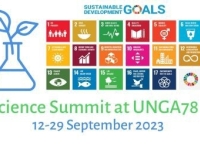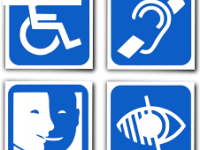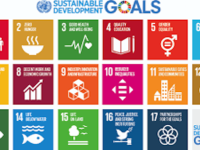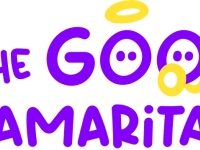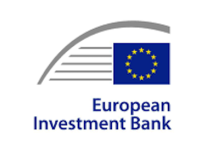Technology
ASSISTIVE TECH SERVES THE DISABLED & IMPROVES THEIR SOCIAL INCLUSION
SESSION AT UNGA78, NYC, 22 SEPT 23
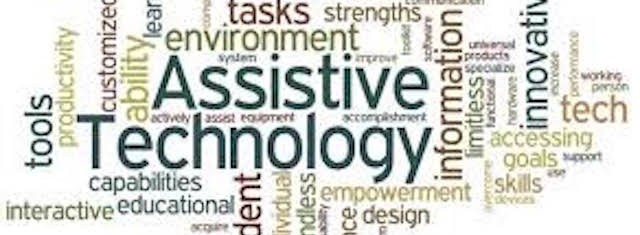
Assistive Technology logo (Source: wikimedia)
USPA NEWS -
One billion and three hundred people (1,3Bn), i.e 17% of the world’s population, experience forms of disabilities. Among those one-fifth (1/5) of the estimated global total, or between 110 million and 190 million people, experience significant disabilities, around 80 percent (80%) of them are in developing countries. (Source: World Bank, EIB). Disability prevalence is even higher for developing countries and those with disabilities are more likely to experience adverse socio-economic outcomes such as less education, poorer health and employment outcomes, and higher poverty rates, social exclusion. According to WHO, forty (40%) of Africa’s population consists of people with disabilities including 10-15 percent (10-15%) of school-age children (Source, WHO, July 2022)
What if we told you, that it’s possible, for a disabled person, to make a difference in this world, in the TECH area, specifically the Assistive Technology, thanks to the A.I (Artificial Intelligence)?
A.T (Assistive Technology) refers to devices, software, programs or even apps that enable people with Disabilities to perform their usual functions to face their impairments.
What if we told you, that it’s possible, for a disabled person, to make a difference in this world, in the TECH area, specifically the Assistive Technology, thanks to the A.I (Artificial Intelligence)?
A.T (Assistive Technology) refers to devices, software, programs or even apps that enable people with Disabilities to perform their usual functions to face their impairments.
ASSISTIVE TECHNOLOGY SERVES PEOPLE WITH DISABILITIES & IMPROVES THEIR SOICAL INCLUSION IS TO BE DEBATED AT UNGA78, 22 SEPT23
One billion and three hundred people (1,3Bn), i.e 17% of the world’s population, experience forms of disabilities. Among those one-fifth (1/5) of the estimated global total, or between 110 million and 190 million people, experience significant disabilities, around 80 percent (80%) of them are in developing countries. (Source: World Bank, EIB). Disability prevalence is even higher for developing countries and those with disabilities are more likely to experience adverse socio-economic outcomes such as less education, poorer health and employment outcomes, and higher poverty rates, social exclusion. According to WHO, forty (40%) of Africa’s population consists of people with disabilities including 10-15 percent (10-15%) of school-age children (Source, WHO, July 2022)
What if we told you, that it’s possible, for a disabled person, to make a difference in this world, in the TECH area, specifically the Assistive Technology, thanks to the A.I (Artificial Intelligence)?
A.T (Assistive Technology) refers to devices, software, programs or even apps that enable people with Disabilities to perform their usual functions to face their impairments.
Starting from this premise, we will take up this one, of-a-kind and yet necessary topic in the era where AI (Artificial Intelligence), is eyed by all the global politicians, legislators, policymakers, and mostly the blue-chip Companies leaders, caught by surprise, since the recent prompt rise of ChatGPT...What makes this approach symbolic and unique comes from the fact that there is a top duo/benefit in the win-win equation of Assistive Technology versus the people with disabilities.
11 OUT OF 17 SUSTAINABLE DEVELOPMENT GOALS (S.D.Gs)ARE CONNECTED TO DISABILITY/INCLUSION
We intend to decrypt the facts, aiming to change the overall mindset over disability/Inclusion and make it sexier in the public opinion’s sight. The session’s core is based on empiricism, by gathering information, data collection and results analysis over the studies conducted on the ground (EU, USA, African countries), combined with relevant testimonies focusing on the power to positively impact society by putting Disability at the heart of 11 out of the 17 SDGs agenda of the UNGA.
Within the hybrid-format session, the distinguished panelists, (Scientists policy-makers, legislators, D&I Managers, AT Expert, civil society actors…) will interact and share their testimonies based on 1st hand experiences based on truthful facts but mostly built on empiricism, data collected, backed by analysis of the results converted into conclusions and perspectives; This methodology intends to show and prove their genuine social impact, in line with 11 out of the 17 S.D.G’s of the UNGA. Topics are to be discussed during the panels, ranging from Assistive Technology, combined to A.I innovations, serving people with disabilities, until the inclusion of the latter: the Disabled beneficiaries, who must be enrolled onboard since the early stage.
The chair of the session, Rahma Sophia Rachdi, will also celebrate the super tangible example via the unveiling of an app to be launched soon, called THE GOOD SAMARITAN, designed by her, as a disabled person (inspired by her own experience of struggling in being assisted over her dependency), dedicated to the people with disability, aiming to increase their autonomy and enhance their emancipation, and climb the ladder of social inclusion. The app will also seek to create human ties bond, and reduce de-socialization, if not marginalization of the Disabled and elderly. The app uses the A.I, for geo-locating a “Helpee” to assist a Disabled person (or Elder) in need, due to their dependency “Helpee”, anywhere anytime. Once the connection is made, and the Good Deed is done, the “Helpee”, can thank the “Helper” via the use of Tokens features, as “fair rewards”…It is also an app, that offers a service of home aid care, in response to the scarcity of the caregivers, in European area. According to E.U, almost 30 % of the EU elderly population with a huge constraint in personal care or household activities used home care services for personal needs. (Source Eurostat, 5 July 2023). In the USA, due to the ageing of the population as well, the United Disabilities Services Foundation (UDS) expects the national caregiver shortage to reach 151,000 by 2030 and 355,000 by 2040; On average, more than 700,000 caregiving positions are expected to open each year through 2032. (Source AARP, 19 June 2023).
So far, these respective governments are facing this shortage of job services, of medic-care and desperately seek solutions. It is a serious health public issue to be solved. The enhanced Beta Version of THE GOOD SAMARITAN app shall be previewed and exclusively showcased at UNGA78 during this session, with the humble ambition to be a game changer, encouraging the world's leading organizations to trigger the network leaders to support and incentive these initiatives, especially towards the emerging countries. In the European Union, the General Data Protection Regulation (GDPR) protects the personal data of the citizens and the A.I Act regulates the application of AI to personal data. (Source: European Parliament, EPRS, June 2020). However, the AI Act differs from the GDPR in several areas. The GDPR defines categories of sensitive personal data but does not identify a-priori, sensitive processing.
The AI Act goes further by categorizing so-called "high-risk" types of AI, which are therefore subject to specific requirements. (Source: Usine Digitale, 11 August 2023). It will be a question of avoiding biases, and so-called "high risk" uses, such as the exclusion of certain remotely public and/or underprivileged, like the failure of Amazon's application device in 2014 an A.I for recruitment, which penalized female candidates. They had to give it up later. This bias towards gender equity should then be anticipated, as much as the one amid the 17% minority of People with Disabilities, by including them from Day One. The U.S. Department of Justice, recently (3 August 2023) published a Notice of Proposed Rulemaking (NPRM) proposing to update the regulations for Title II of the Americans with Disabilities Act (ADA) to better ensure web and mobile app accessibility for people with disabilities. (Source U.S Department of Justice, August 2023).
To do so, Assistive Technology offers more innovative solutions, responding to the needs of people with disabilities, with great engagement and inclusion of the beneficiaries, if enrolled in the process itself of designing the devices, to tailor the solutions/versus/needs.
EIB IS PROUD TO HAVE RECENTLY SIGNED UP THE CHARTER OF THE 500 VALUABLE FOR DISABILITY/INCLUSION
This approach concerns not only improving the understanding, but also sharing knowledge between countries, making connections across the differences, (Diversity & Inclusion) and better the workplace, but also represents a powerful niche, in the digital ecosystem. It plays the game of raising a great awareness for the major European and US policymakers, but from now on, even the stakeholders, are co-constructing beyond their regions, overlapping their zone of comfort, via the reverse mentoring programming towards African countries, for example, such as the EIB does (European Investment Bank). This European Bank joined recently, proudly the 500 Valuable, international platform that connects the most renowned, multinationals, placing Disability/Inclusion at the top of their management agenda. (Source EIB, July 2021). Hence, it is important to elaborate a strategy in prior and to convince the innovators and start-uppers to include them in the very early stage of their device’s design, and innovative software, for a fairer and genuine inclusion. This will increase the pragmatic improvements in its systems policies and practices, in line with the UNGA’s 17 S.D.G’s, across the worldwide leading organizations, by including the emerging countries, more now than ever for a fair and sustainable future.
PERSPECTIVES
The future will tell, if this approach succeeded in seeing the Disabled differently, from a new perspective and has brought about great sustainable changes, has improved the too-low rate of inclusion of people with disabilities; who should be renamed "People Different-Able”, rather than “People Dis-Abled", since this minority of 17% of the world, does matter. Never has semantics been so relevant as when it comes to naming this often-declassed minority, and stigmatized by the very denomination of their condition.
The future will tell, if this approach succeeded in seeing the Disabled differently, from a new perspective and has brought about great sustainable changes, has improved the too-low rate of inclusion of people with disabilities; who should be renamed "People Different-Able”, rather than “People Dis-Abled", since this minority of 17% of the world, does matter. Never has semantics been so relevant as when it comes to naming this often-declassed minority, and stigmatized by the very denomination of their condition.
As a matter, of fact, these people are not Dis-Abled, but they are "Able" differently, and they have a lot to offer to the majority within a fair society that seizes their value and takes part in the common progress, for the sake of the human kind’s sustainability.
At that moment, the word "Inclusion" will be no more than an element of language and unnecessary, after having paved the way, for the generations to come. Aided by the AI's exponential growth, which should enroll them, the Different-Able will be offered a fantastic window for their talent to shine, as much as they will benefit from the Assistive Technology's innovations and being a contributor, despite their impairment, yet also thanks to this Different'Ability!
Liability for this article lies with the author, who also holds the copyright. Editorial content from USPA may be quoted on other websites as long as the quote comprises no more than 5% of the entire text, is marked as such and the source is named (via hyperlink).

